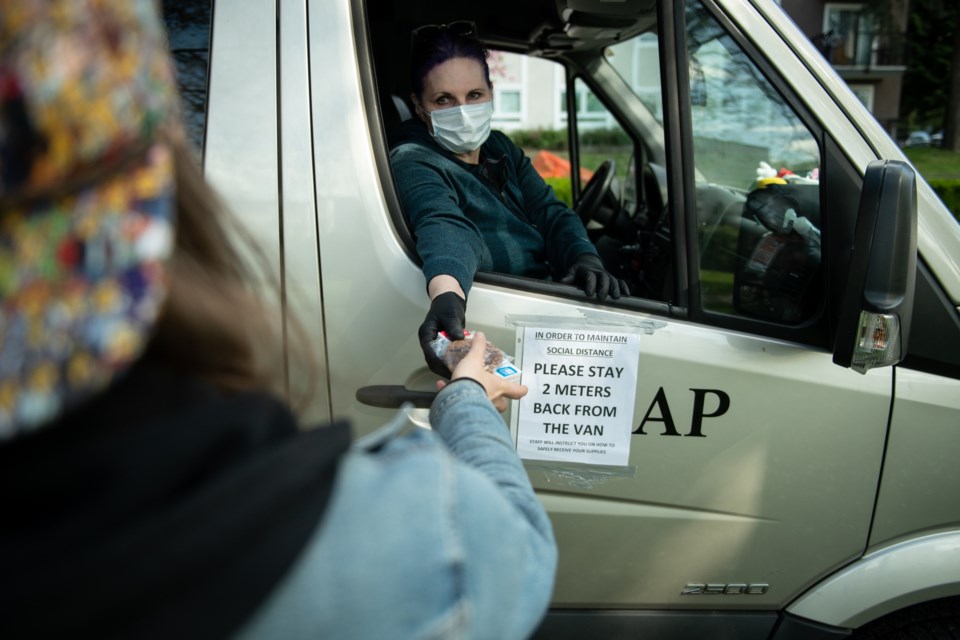The run by , is a unique program that is literally on the ground. It is a roving operation that is uniquely positioned to support street-based sex workers throughout the entire city of Vancouver.
Now, in its 17th year of operation and onto its fourth van, the operation is at risk of coming to a halt.
The program is the van and with over 110,000 km on the odometer, the vehicle has reached the end of its lifespan. Experiencing frequent breakdowns with smoke billowing from it and costly repairs, WISH desperately needs to replace the vehicle but that is proving more difficult than one might imagine.
The program provides outreach services to street-based sex workers in shifts, from noon to 6 p.m. during the day and 11 p.m. to 5 a.m. overnight. The van meets participants who often work in isolated areas of the city and in places where perhaps there are no other services. Because of this, they are extremely vulnerable and often targeted. On board, the MAP van has everything from harm reduction supplies, safe sex supplies, meals, snacks, clothing, and hygiene products.
"We also do a lot of information and referral," says WISH executive director Mebrat Beyene. Those referrals can be back to WISH resources such as the drop-in centre, the shelter, or health clinic. But staff also offer referrals to programs and services that WISH doesn't run like housing, detox, mental health and addiction support.
The MAP van also takes the most bad date reports according to Beyene. "So that would be reports of either violence, predatory behaviour, or sketchy behaviour that sex workers are seeing out while they're working as a mechanism to warn other sex workers," she says.
Wish has managed to secure funding from the Province of BC to purchase a new customized van but due to supply chain issues, it is not available yet and WISH has been told that the wait time is over a year. During 2021 alone, the MAP van staff handed out 108,718 sterile needles, 53,672 condoms, 65,999 food and drinks, and had 21,109 participant interactions and so the consequences of taking their most crucial frontline program of the road would be devastating.
"The street-based sex workers that use that data and rely on that van are folks who are quite actively working," says Beyene, including many of whom are already isolated and only accessing the van's services.
"It might be the only support that they have, and that can be everything from physical safety, to peer support, breaking down some of the isolation of working alone in remote parts of the city. Really important access to supplies that folks can't afford in order to keep themselves safe," Beyene explains.
The MAP van is a critical line of reporting for the entire sex work community because they are able to spread the word and warn others. "It tends to be a really important safe harbour. So just knowing that the van is there, that you can flag it down, that it can be a witness that it can be a way to just get out of the way out of the cold for a few moments is also really important."
WISH has looked into renting a van in the interim but the rising costs have become prohibitive; they can't borrow one from other providers because they are suffering from the same supply chain issues. The City of Â鶹´«Ã½Ó³»is also looking through their fleet to see if they have a van that could work for WISH but their needs are so specific that space and capability are a real concern in choosing the right vehicle.
WISH is appealing to the public to see if anyone has or knows of a vehicle that can be donated or if someone has dealership connections. Specifically, they are in search of something that has a medium or long wheelbase, a high roof because the staff are standing up and walking back and forth in the back and without seats in the back because there needs to be space to store the supplies and materials they're taking out every single day. The final consideration is condition. Their vans see heavy use so they need a vehicle in good condition with low mileage to make the most of its longevity.
"We're in a moment when we know how bad gender-based sexualized violence is right now, and how much worse it's become during COVID," says Beyene. Sex work has gotten harder and more dangerous since the pandemic but people are relying on it for survival "this program being mobile is uniquely positioned to really meet the needs of quite a lot of people in a way that our physical space can't do because we're just in one location, people have to come to us. So we're very concerned and trying to remain hopeful that we can get back on the road as soon as possible."
If you know of a vehicle or can help in anyway please contact WISH.



